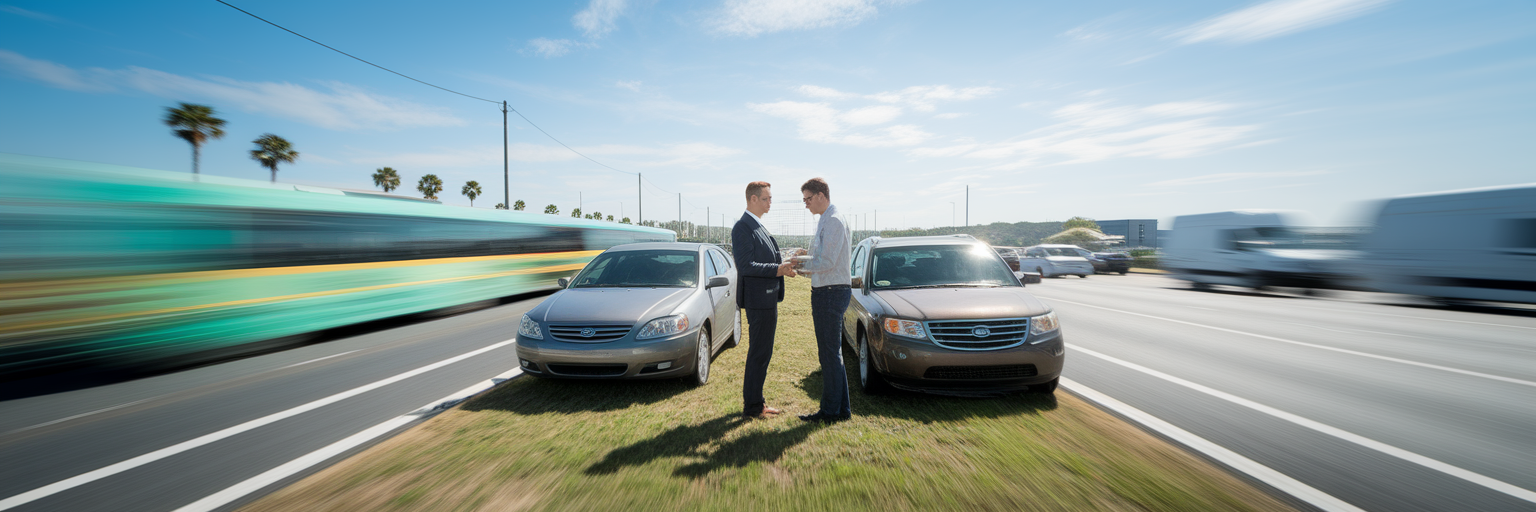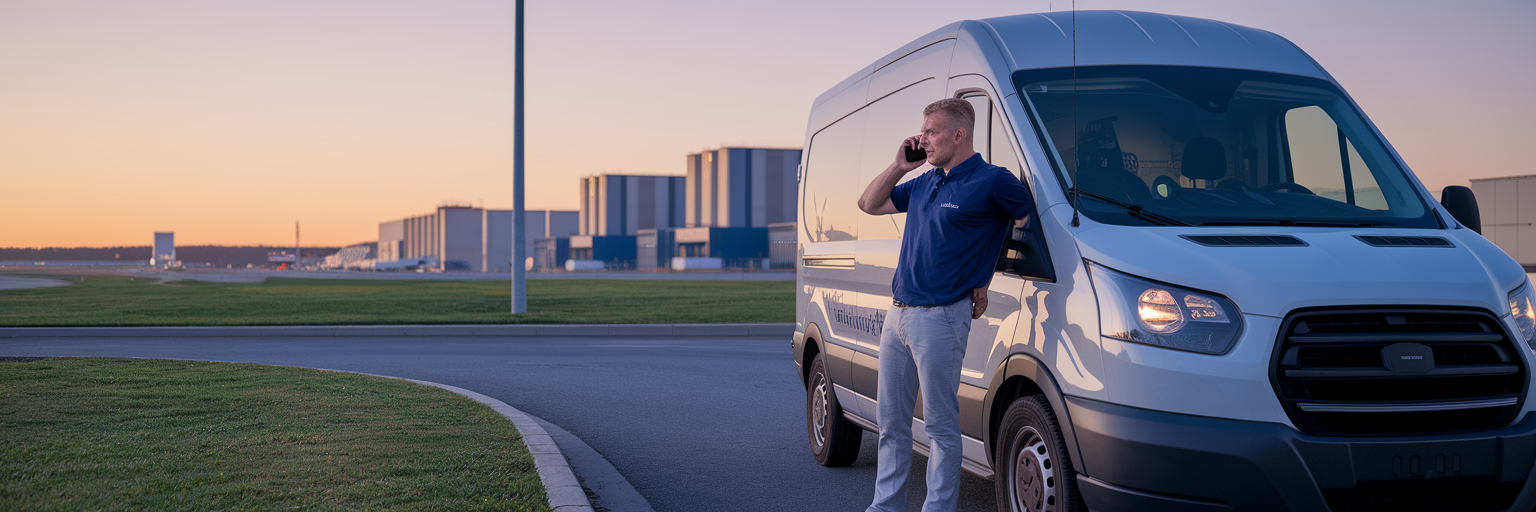Why Aviation Avenue is a High-Risk Zone for Collisions
Aviation Avenue serves as the main artery to Charleston International Airport (CHS), but it’s far from a typical city street. It’s a unique convergence point where different types of drivers, each with a different mindset, share the same space. You have tourists in rental cars, often looking down at a GPS instead of up at the road. Alongside them are local drivers, sometimes rushing to catch a flight or pick someone up. Add to that the constant stop-and-go of airport shuttles and taxis making sudden stops, plus the commercial delivery trucks servicing the airport’s ecosystem.
This specific blend of unfamiliar, hurried, and commercial traffic creates a volatile environment. The risk of an Aviation Avenue car crash is heightened simply because of this mix. This article provides a clear guide for what to do after a collision in this complex area, with a special focus on incidents involving rental and commercial vehicles.
Immediate Actions to Take at the Scene
In the disorienting moments after a crash, having a clear plan is essential. Your actions at the scene can protect your health and your potential claim. Here is what to do after car accident SC, broken down into critical steps.
First, prioritize safety and medical care. Check yourself and your passengers for injuries. Some injuries, like whiplash or internal bleeding, may not be immediately obvious. Call 911 right away to report the collision and request medical assistance if needed. This call also ensures that law enforcement arrives to create an official police report, a vital piece of evidence for any future insurance claim or lawsuit.
Next, if it is safe, secure the accident scene. On a busy road like Aviation Avenue, preventing a secondary collision is critical. If your vehicles are movable, guide them to the shoulder or a nearby safe area. If they cannot be moved, turn on your hazard lights to alert other drivers. Your safety and the safety of others is the immediate concern.
Once the scene is secure, exchange and gather information. You need the other driver’s full name, contact details, driver’s license number, license plate, and insurance information. It’s natural to feel apologetic, but avoid admitting fault. Stick to the facts of what happened. A simple “I’m sorry” can be misinterpreted by insurance adjusters later on.
Finally, document everything. Use your smartphone to become your own investigator. Take photos and videos of the damage to all vehicles, the accident scene from multiple angles, nearby traffic signs, road conditions, and any visible injuries. This visual record can be invaluable, capturing details you might otherwise forget.
Handling Accidents Involving a Rental Car
A collision in a rental car introduces layers of complexity that don’t exist in a typical accident. If you’re involved in a rental car accident Charleston SC, you’ll need to gather the standard information plus the rental company’s name and the rental agreement number. The real challenge, however, lies in figuring out which insurance policy is responsible for covering the damages.
You might be covered by your personal auto policy, a credit card benefit, or the insurance you purchased at the rental counter. Each comes with its own rules and limitations, creating a confusing puzzle when you’re trying to get compensation.
| Insurance Type | What It Typically Covers | Key Considerations |
|---|---|---|
| Personal Auto Insurance | Extends your existing liability and collision coverage to the rental car. | May not apply to all vehicle types (e.g., moving trucks). Check your policy limits. |
| Credit Card Benefits | Often provides secondary collision damage coverage. | Usually requires you to decline the rental company’s waiver and pay with that card. Liability is rarely included. |
| Rental Company’s Insurance (LDW/SLI) | Loss Damage Waiver (LDW) covers damage to the rental. Supplemental Liability Insurance (SLI) covers damages to others. | Adds significant cost to the rental but provides direct coverage, simplifying the claims process. |
Beyond insurance, the rental company itself could be liable. According to a report from Live 5 News, South Carolina lawmakers have worked to hold rental companies accountable for accidents caused by poor maintenance. If the crash was due to faulty brakes or bald tires, the responsibility could shift to the company that rented you the vehicle. After an accident, you must report it to both your personal insurer and the rental agency. Document every conversation, as these details are crucial for protecting your rights.
When a Commercial Vehicle is Involved
A collision with a delivery van, hotel shuttle, or large truck is not just a more severe accident; it’s a more complex legal situation. A commercial vehicle accident Charleston often involves more than just the two drivers. The legal principle of vicarious liability means an employer can be held responsible for the negligence of an employee who was on the clock. This means the company that owns the shuttle or delivery truck could be a party to your claim.
Furthermore, the company itself may be directly negligent. This is known as corporate negligence, and it can happen in several ways:
- Inadequate driver training or failing to conduct proper background checks.
- Pressuring drivers to meet unrealistic schedules, which can encourage speeding and other unsafe behaviors.
- Failure to perform required maintenance and safety inspections on their vehicles.
- Improperly loading cargo, leading to an imbalanced vehicle or a spill that causes an accident.
Identifying all potentially liable parties, from the driver and their employer to third-party maintenance contractors, requires a detailed investigation. These companies and their insurers have teams of lawyers dedicated to minimizing their financial exposure. This is why these cases often demand professional legal guidance to level the playing field. If the accident involved a semi-truck or another large commercial vehicle, the case involves specific federal and state regulations. Investigating these claims requires specialized knowledge, which is why victims often seek help from Charleston truck accident lawyers.
Navigating South Carolina’s Legal Framework
Understanding the rules that govern car accident claims in South Carolina is essential for protecting your rights. The state operates under an “at-fault” insurance system. In simple terms, this means the person or entity who caused the accident is financially responsible for the resulting damages, including medical bills, lost wages, and vehicle repairs.
However, there is a time limit for taking action. In South Carolina, you generally have three years from the date of the accident to file a personal injury lawsuit. While that may sound like a long time, investigating a complex crash, gathering evidence, and negotiating with insurance companies can be a lengthy process. Missing this deadline, known as the statute of limitations, can mean losing your right to compensation forever.
When an accident involves the added layers of rental car agreements or corporate liability, the claims process becomes significantly more challenging to handle alone. This is why anyone involved in a collision near the airport should consult with an experienced Charleston airport car accident lawyer. Professional guidance ensures all at-fault parties are identified and all deadlines are met. Given the complexities of proving fault and dealing with multiple insurance companies, seeking professional guidance is a critical step. An experienced team of Charleston car accident lawyers can manage the legal process while you focus on recovery. If you have questions about your specific situation, you can get in touch with our team to discuss your case.


